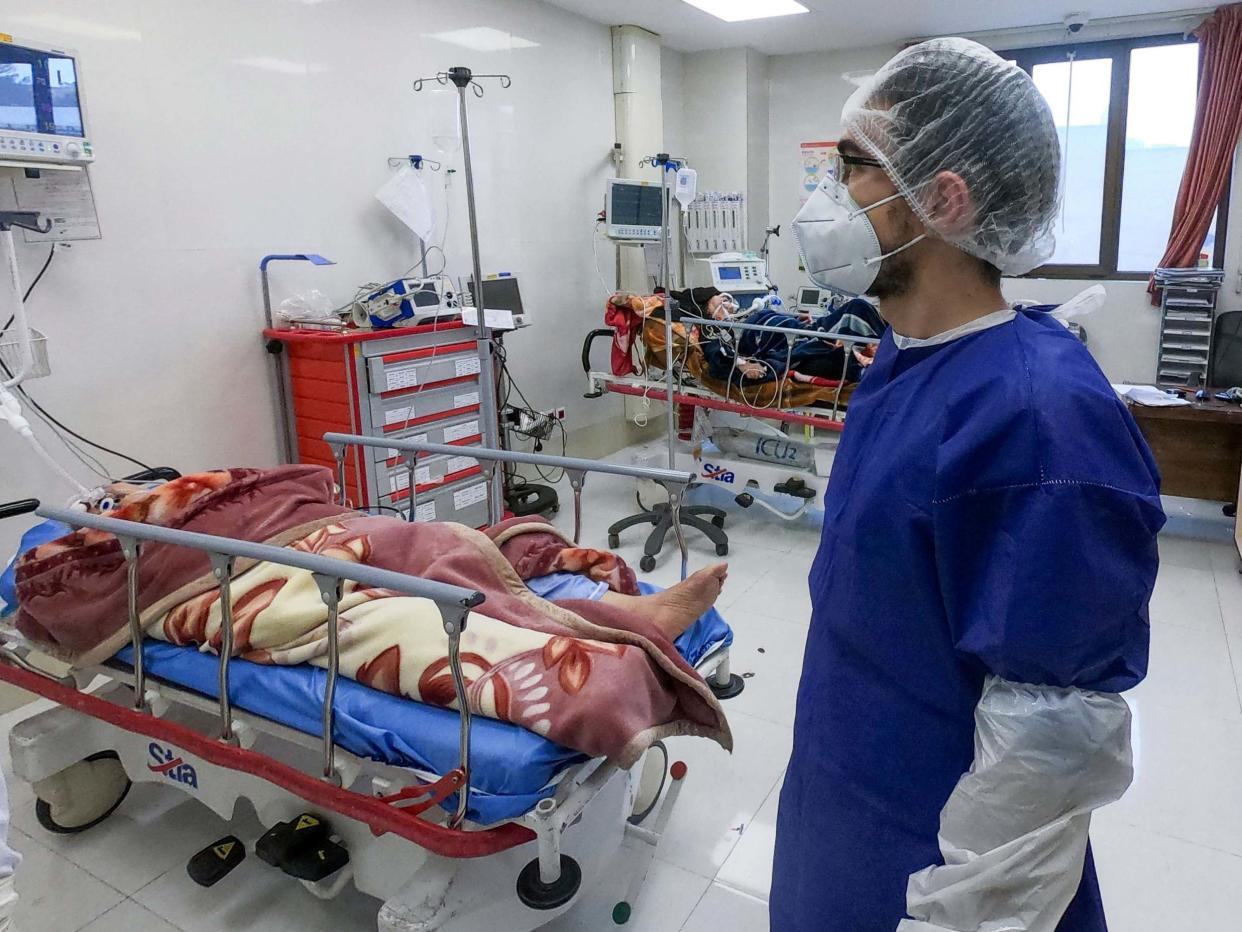‘There is nothing to worry about’: Opaque regime in Iran insists coronavirus under control as vice-president latest high-profile patient

A top official in the inner circle of Iran‘s president became the latest senior figure in the country to contract the coronavirus, as the number of deaths spiked – to at least 26, with 245 cases confirmed.
Massoumeh Ebtekar, Iran’s vice-president for women’s affairs in the administration of President Hassan Rouhani, was the most high-ranking official to come down with the flu-like illness, after the head of parliament’s national security committee and the deputy health minister also fell sick.
To curtail the spread of the virus, Iranian officials urged residents to avoid travel within the country and have cancelled Friday prayer services in Tehran and elsewhere.
Covid-19, first identified in China, has hit Iran particularly hard, with its epicentre in the shrine and seminary city of Qom, a crossroads that draws pilgrims, religious students and clergy from across the world.
The virus has severely affected commerce and travel in the Persian Gulf region. The number of cases in Kuwait jumped overnight to more than 40, and Saudi Arabia suspended trips to the kingdom for the pilgrimage to Mecca.
In Iran, the spread of the virus has further strained the country’s leadership at a time of intense political and economic pressure.
Containing a public health crisis without causing panic requires public faith in institutions and a measure of transparency by officials. Both qualities are rare in Iran.
The cancellation of Friday prayers in Tehran and other cities is unprecedented; the weekly gatherings are a pillar of the regime. The spread of the illness to senior members of the government has underscored the severity of the outbreak.
On Thursday, Mojtaba Zonnour, a hardline member of Iran’s parliament and cleric representing Qom, posted a 40-second video announcing that he was infected and under quarantine.
“My corona test has come out positive; there is nothing to worry about,” he said. “God willing our people will defeat the corona.”
He spoke a day after the deputy minister of health, Iraj Harirchi, looking haggard and pale, posted a video declaring he too had come down with the virus, a respiratory infection with influenza characteristics.
The extent of the outbreak in Iran has caused neighbouring countries to shut land borders and suspend air links, effectively isolating the country from the much of the world. Iran has also barred Chinese nationals from entering the country.
Iranian officials’ handling of the virus has repeatedly come under question, underscoring a history of mutual mistrust between the clerical regime and the population.
On Wednesday, a health official went on television to boast that she was treating coronavirus patients without wearing a surgical mask, in what many saw as a stunt by the regime to downplay the illness.
The reported 10 per cent mortality rate in Iran is far higher than the 2 per cent in China, and experts suspect this is because officials are undercounting cases. A group of Canada-based researchers estimates there could be 18,000 infections in the country.
“[Iranian authorities] don’t want to admit that they’re facing a major outbreak,” public health expert Kamiar Alaei, who developed HIV guidelines for Iran before being driven into exile, told the Centre for Human Rights in Iran. “Because they hid the outbreak in Iran, health guidelines were not promptly updated, and healthcare workers were not trained on how to deal with it. Nobody was prepared or ready for it.”
US Secretary of State Mike Pompeo, an architect of Washington’s campaign of “maximum pressure” on Iran over its support for armed groups and expanding missile programme, this week chided Iranian officials for allegedly covering up the extent of the outbreak.
“The United States is deeply concerned by information indicating the Iranian regime may have suppressed vital details about the outbreak in that country,” he told reporters. “All nations, including Iran, should tell the truth about the coronavirus and cooperate with international aid organisations.”
But the US, eager not to appear to hamper efforts to stamp out the disease, also announced that a Swiss-run channel to funnel medicine to Iran despite its crippling sanctions was “fully operational” by Thursday.
[Authorities] don’t want to admit that they’re facing a major outbreak. Because they hid the outbreak in Iran, health guidelines were not promptly updated, and healthcare workers were not trained on how to deal with it. Nobody was prepared for it
Kamiar Alaei, Centre for Human Rights in Iran
Yet Iranian officials also appear to be at least attempting to give the impression of transparency. State television has covered the outbreak aggressively, and news agencies have posted maps and charts showing the spread of the illness.
Authorities worried about the impact coronavirus will have on the economy have taken pains to show they remain firmly on top of the crisis.
“Your job is very valuable,” the supreme leader, Ali Khamenei, said in a message to health workers on Thursday. “It also increases the value of doctors and nurses in society. In addition, God will surely give you a divine reward.”
Saudi Arabia has banned all religious pilgrims and foreigners from coronavirus-hit countries from entering the country over outbreak fears, just months before the annual hajj pilgrimage to Mecca.
Read more
Iran minister appeared unwell before coronavirus diagnosis
Iran’s coronavirus outbreak is reminiscent of the Black Death
Iran attacks US for ‘coronavirus propaganda’
Up to 50 die from Coronavirus in Iran as health systems struggle
Iran hardliners sweep to crushing victory in parliamentary elections

 Yahoo News
Yahoo News 
